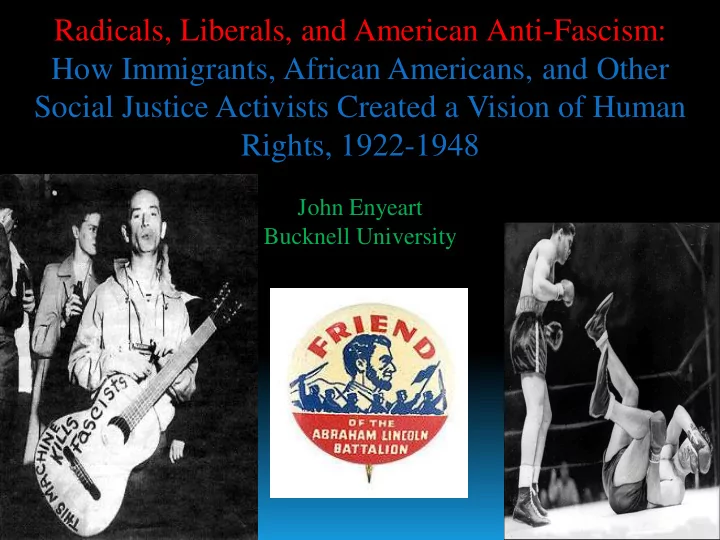

Radicals, Liberals, and American Anti-Fascism: How Immigrants, African Americans, and Other Social Justice Activists Created a Vision of Human Rights, 1922-1948 John Enyeart Bucknell University
Anti-fascist activists crafted an early vision of human rights
This was not one united movement, but various groups of people arguing that they saw fascist trends in American political discourse and behavior. Anti-Fascists insisted that if the U.S. was the antithesis to fascism, as many claimed, the federal government had to protect the personal liberties of workers, African Americans, and immigrants as well as the rights of nations to determine their own form of government and the U.S. had to treat those nations as equals on the world stage.
A Bit of Background I. Four Vignettes II. III. Anti-Fascist Voices IV. Conclusion
How anti-Fascist was the U.S.? (just a few examples) During the 1920s, J.P . Morgan loaned the Italian government $100,000,000 In the 1930s, Standard Oil, with the Roosevelt Administration‟s knowledge, sold German based company I.G. Farben 500 tons of an additive necessary for production of jet fuel. The Nazi government was the only client that could have made such a purchase, and shortly after this deal was completed, the Germans attacked Czechoslovakia. J. Edgar Hoover‟s Federal Bureau of Investigation, under Franklin Roosevelt‟s watch, allowed the Italian Fascist Secret police to spy on over 6,000 Italian Americans (on U.S. soil) who Mussolini‟s government deemed subversives. FDR, Congress, and much of the American public did little as Mussolini‟s forces invaded Ethiopia in 1935. From 1936 to 1939, American statesmen refused to aid the democratically elected government of Spain, despite a flood of petitions from thousands of Americans, when Fascist-backed General Francisco Franco‟s uprising forced that nation into civil war. FDR and most of congress refused to try and change immigration laws so that Jews fleeing Hitler‟s murderous rule could find refuge in the land of the free.
A bit of background I. II. Four Vignettes Anti-Fascist Voices III. IV. Conclusion
Mussolini and some Blackshirts
• “A Fascist is one whose Henry Wallace Vice President, 1941-45 lust for money or power is combined with such an intensity of intolerance toward those of other races, parties, classes, religions, cultures, regions or nations as to make him ruthless in his use of deceit or violence to attain his ends.”
Langston Hughes He asked if the people of these nations could “learn from folks with Dixie-like manners? I mean,” he continued, could “they learn to be democratic from gentlemen who practice only confederate democracy ?” Confederate democracy meant conceptualizing the “Negro” as “sub - human” and “therefore „ human rights ‟ do not apply to us.” Hughes then added that the “United Nations Commission is going to have a harder time getting America to recognize Negro rights than they would have in persuading us to recognize Nazi rights or Franco rights.”
A bit of background I. Four Vignettes II. III. Anti-Fascist Voices IV. Conclusion
Carlo Tresca Communists Norman Thomas I.F. Stone Carey McWilliams Dorothy Thompson Louis Adamic The Black Press and African American Writers
Throat cut Office bombed Kidnapped Shot four different times
Daily Worker 1933
For Schuyler, the KKK proved the possibility that “a great mass movement in this country with the sole aid of superstition, race prejudice, uniforms and almost unintelligible mumbo jumbo far removed from reality” could emerge and grab hold of the nation’s collective imagination
James Weldon Johnson “There is no apparent probability that the United States will go over to Communism; but the same cannot be said about Fascism.” He added that most African Americans “have for long years lived in the Fascist South; so it is hardly possible that we could fare worse under a national Fascist government.”
The lynching of Rubin Stacy, July 19, 1935, Fort Lauderdale, Florida
From “the beginning the Ethiopian crisis became a fundamental question in Negro life.” The “survival of the black nation became the topic of angry debate in poolrooms, barber shops, and taverns.” “I know of no event in recent times that stirred the rank-and-file of Negroes more than the Italo- Ethiopian War” “Negroes in America had cast their lot with the colored peoples Roi Ottley elsewhere in the world!”
Members of the American League Against War and Fascism picket the Italian Consulate on Fifth Avenue, New York, protesting against the brutality of the Italian troops during their invasion of Abyssinia, May 1936.
Stuff I Wish I Had Time to Talk About Louis v. Schmeling 6/22/1938.
Recommend
More recommend